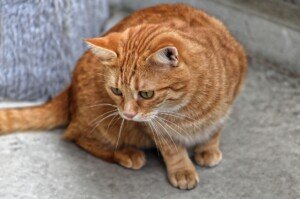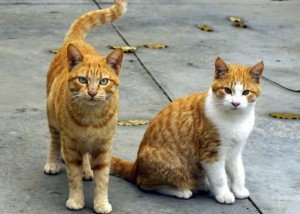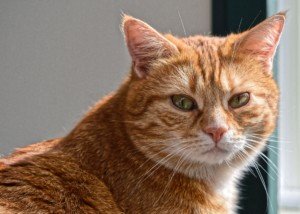
An old cat can vomit for several reasons, some benign and some serious.
Cause #1 of an old cat vomiting
One cause can be diet, says Dr. Jules Benson, BVSc, chief veterinary officer with NationwideDVM, a pet insurer company.
An aging cat is less efficient at digesting foods that previously gave it no trouble.
“Your cat may have thrived on an inexpensive store-brand food for years, but poor quality proteins can get harder for older pets to break down,” says Dr. Benson.
The solution is a high-quality “senior pet” or “sensitive stomach” formula.
Aside from aging, older cats may develop allergies to certain food proteins, though this problem is more common in younger felines.
Switching your older cat over to a fish, lamb or a venison based diet may help alleviate vomiting.
Cause #2 of an old cat vomiting
Hairballs. An older can may lose more fur, meaning, more hairballs. “Using a hairball-specific diet or supplementing your cat’s diet with a lubricant like Laxitone (available from your veterinarian) can help ease hair through the GI tract,” says Dr. Benson.
What would be preferable, though, is to regularly brush your old cat with a special tool that helps remove the undercoat, like the Furminator (at pet stores).
Cause #3 of an old cat vomiting
Disease, and many, can cause this issue. Dr. Benson lists the following: cancer, GI ulceration, poisoning, ingestion of a foreign body, thyroid disease, kidney disease, pancreatitis and parasites.
And, just like in some people, stress can cause vomiting. A cat can be stressed enough to get sick.
“Your veterinarian will likely recommend a basic set of tests, including blood work, urinalysis (yes, even if your pet is urinating normally!), fecal testing and radiographs (X-rays), and may recommend additional tests like ultrasonography, GI-specific blood panels, endoscopy and/or biopsies,” explains Dr. Benson.
Cause #4 of an old cat vomiting
Feeding/eating patterns. Dr. Benson explains that cats that are “portion-fed at regular intervals may anticipate mealtimes and produce large amounts of gastric acid, which can cause them to throw up prior to food, or just after.”
If a cat gobbles up food, this too can cause it to upchuck. If you notice this pattern, try feeding your pet very small amounts of food when they “start to get vocal about mealtimes,” says Dr. Benson. Break their meal up into smaller portions.
“Overproduction of gastric acid can also be helped with some medications; your veterinarian will be able to help.”
If your older cat has been vomiting, don’t delay a vet visit by first trying home treatments; see the doctor promptly to rule out serious causes as soon as possible.










































